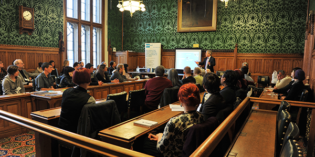Book reviews

Book Review | Peter Shore: Labour’s Forgotten Patriot by Kevin Hickson, Jasper Miles and Harry Taylor
In Peter Shore: Labour’s Forgotten Patriot, Kevin Hickson, Jasper Miles and Harry Taylor looks back at the ‘lost Eurosceptic tradition’ within the Labour Party’s history by examining the life of the largely neglected front-rank politician, Peter Shore. This skillfully crafted and revealing biography not only reappraises Shore’s career, but uses this as a lens to examine salient issues in the historical development of the Labour Party, writes Patrick Diamond.

Book Review | Dramas at Westminster: Select Committees and the Quest for Accountability by Marc Geddes
In Dramas at Westminster: Select Committees and the Quest for Accountability, Marc Geddes aims to open up everyday life along the committee corridors of the Palace of Westminster to examine how the UK Parliament performs the role of scrutiny. The book tells us a great deal about the public and hidden power of select committees at a time when scrutiny is more vital than it has ever been, writes Ben Worthy.

Book Review | Contentious Rituals: Parading the Nation in Northern Ireland by Jonathan S. Blake
In Contentious Rituals: Parading the Nation in Northern Ireland, Jonathan S. Blake offers a new examination of the complex phenomenon of Protestant parading in Northern Ireland, drawing on carefully compiled sociological and ethnographic data to argue that, in the words of his participants, what motivates the majority of paraders, musicians and spectators is not political, ethnic or religious chauvinism, but rather commitment to a longstanding cultural practice positioned as antipolitical. This is a nuanced and rich study, writes Nicholas Baker, that will be of great value to anyone interested in contemporary politics in Northern Ireland.

Book Review | Other People’s Politics: Populism to Corbynism by J.A. Smith
In Other People’s Politics: Populism to Corbynism, J.A. Smith seeks to critically analyse and historicise our contemporary political moment, tracing the conditions that made movements like Corbynism possible, while also diagnosing their shortcomings and mapping out potential strategies for a new Left Populism. This is a welcome critical intervention into debates on populism and should be read by scholars across the social sciences and humanities, recommends Paul Ewart.

Book Review | The New Populism: Democracy Stares into the Abyss by Marco Revelli
In The New Populism: Democracy Stares into the Abyss, Marco Revelli explores the definitions, historical development and electoral geography of populism across much of Europe and the United States, focusing particularly on the relationship between populist politics and neoliberalism. While the book provides a wealth of detail on the ideology and history of populism and is particularly strong in examining Italy and its various populist vehicles, its reiteration of familiar themes in the literature risks the book falling behind the cutting edge of populism studies, writes Ben Margulies.

Book Review | No. 10: The Geography of Power at Downing Street by Jack Brown
Few front doors are as instantly recognisable as that of 10 Downing Street, but can its interior tell us anything worthwhile about politics? In No. 10: The Geography of Power at Downing Street, Jack Brown argues that not only have individual UK Prime Ministers shaped the building during their tenure, but the capacity and shape of No. 10 have also influenced the role of the PM and the machinery around it. Packed with anecdotes and descriptions, this is a novel analysis, writes Artemis Photiadou, that successfully makes the case for incorporating No. 10 into future studies of British politics.

Book Review | Unjust Borders: Individuals and the Ethics of Immigration by Javier Hidalgo
In Unjust Borders: Individuals and the Ethics of Immigration, Javier S. Hidalgo makes a clear and engaging case for open borders, arguing that immigration control is unjustly coercive and outlining the responsibilities we have as individuals when it comes to responding to this injustice. This book is essential reading for scholars studying migration and policymakers policing it, writes Mollie Gerver, as well as for all citizens deciding what to do in a world where borders remain closed and movement remains curtailed.

Book Review | Populism by Benjamin Moffitt
In Populism, Benjamin Moffitt offers a new study that looks to assess the current state of scholarship on populism. Going a significant way to providing the clarity that can be so lacking when it comes to understanding populism, this is an essential textbook that Jake Scott recommends to anyone looking for an entry into the field.

Book Review | An Epistemic Theory of Democracy by Robert E. Goodin and Kai Spiekermann
In An Epistemic Theory of Democracy, Robert E. Goodin and Kai Spiekermann offer a systematic argument articulating the epistemic value of democracy, aiming to show that democracies have an important advantage over other forms of government due to their truth-tracking potential. This instrumental argument in favour of democratic institutions is an important contribution to debates surrounding the value of democracy at a time of political turbulence and abundant scepticism about the operation of politics, writes Camilo Ardila.

Book Review | The Digital Party: Political Organisation and Online Democracy by Paolo Gerbaudo
Voter turnout is decreasing in mature democracies at an alarming rate since the advent of digital communications, a trend that is significantly affecting the legitimacy of political parties. Does this mean that parties are fated to disappear? In The Digital Party: Political Organisation and Online Democracy, Paolo Gerbaudo argues that political parties are far from becoming obsolete. Discussing the emergence and implications of a new type of party in the digital era characterised by its strong dependence on interactive online platforms, this book is necessary reading, writes David Jofré.


 Democratic Audit's core funding is provided by the Joseph Rowntree Charitable Trust. Additional funding is provided by the London School of Economics.
Democratic Audit's core funding is provided by the Joseph Rowntree Charitable Trust. Additional funding is provided by the London School of Economics.